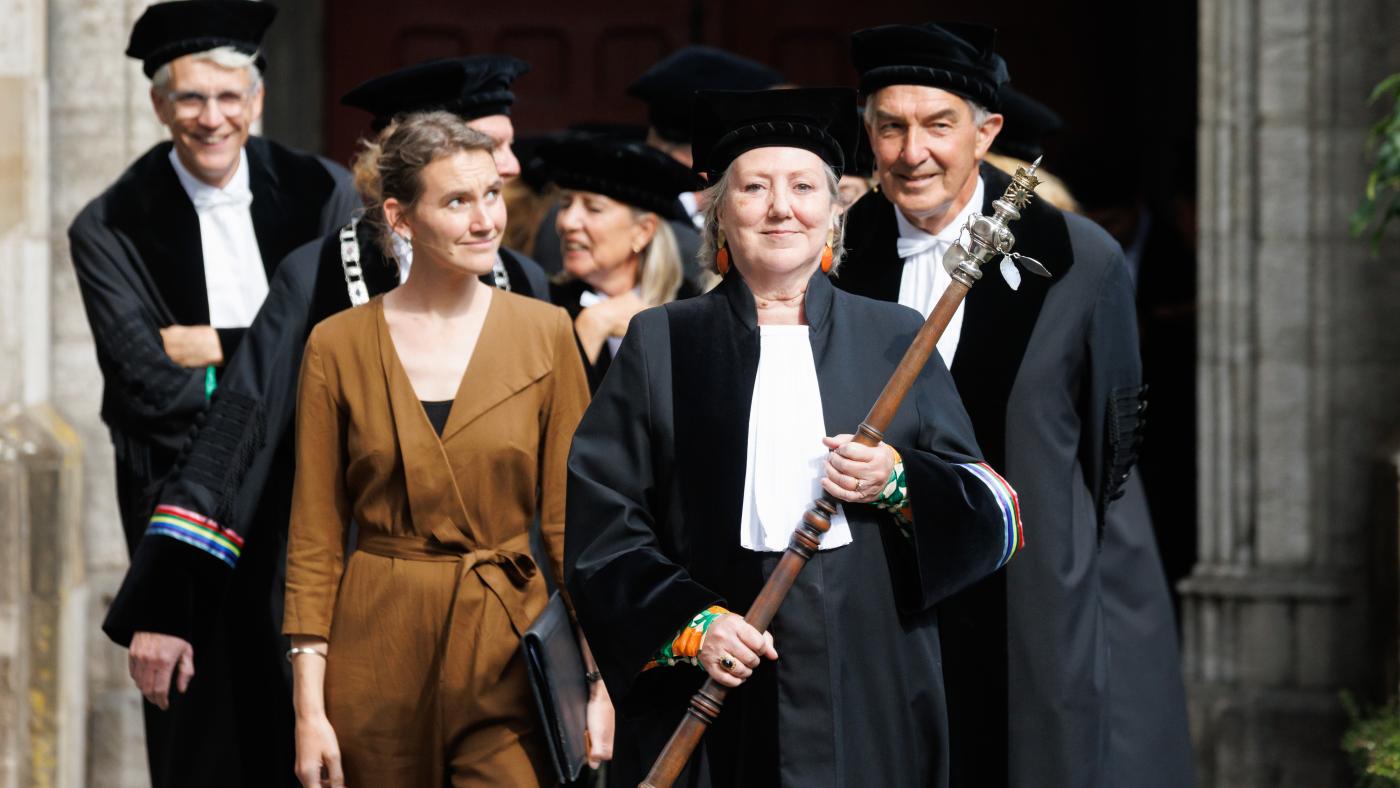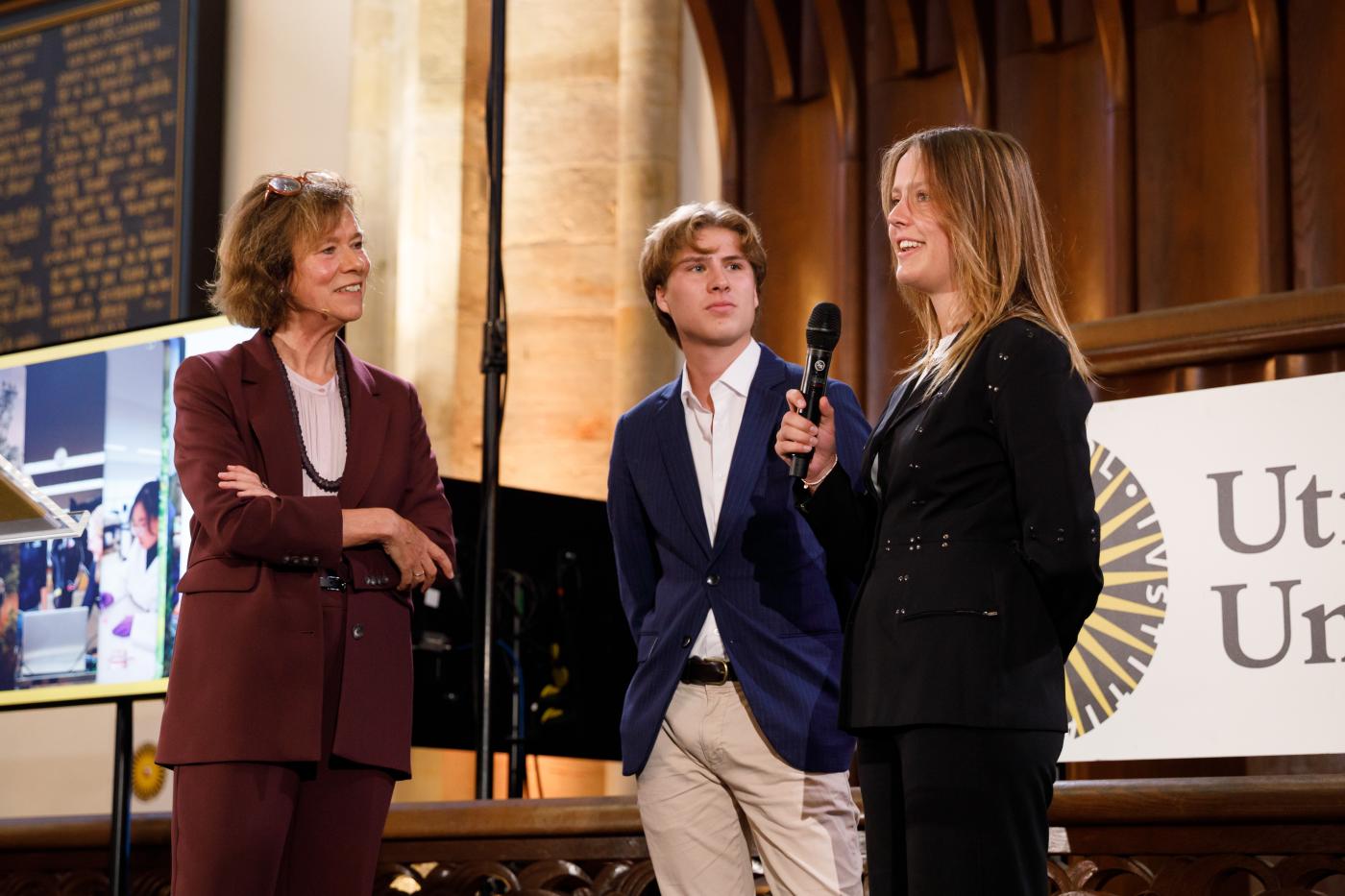Except in Utrecht
Opening of the academic year marked by protests across the country

The Dutch Prime Minister, Dick Schoof, attended the ceremony to mark the start of the academic year at the University of Twente. Schoof spoke briefly with activists who would have preferred him not to attend. They weren't the only ones who disagreed with the prime minister's presence: dozens of seats were empty, as staff and students expressed their discontent by not going to the ceremony at all.
According to U-Today, those who opted to protest in the hall shouted during Schoof's speech in an attempt to disrupt it. Not everyone supported the activists, as a call from the moderator to listen to each other was met with applause.
“I understand that”
The protesters are angry about populism, the budget cuts, and the war in Gaza, which they believe the cabinet is not doing enough to oppose. Schoof could do little but show understanding. "I know that my presence is not welcomed by everyone, and I understand that," he said in his speech.
However, Schoof also defended the cabinet's line, including the severe budget cuts affecting higher education and research. "Politics is a matter of distributing scarcity," he stated. He also referred to the power shifts going on in the world and the need to strengthen the army. Twente is home to several defence companies, as well as research projects into computer chips. The minister said that investing in these two areas is also good for the university.
Twente University President Vinod Subramaniam told the Prime Minister that reducing the budget for science has major consequences. "If you think knowledge is expensive, just look at what stupidity costs," he grumbled.
Inside
The Opening of the Academic Year went smoothly here in Utrecht. The Executive Board seems to have learned from the incident that took place at the university's anniversary ceremony, when demonstrators lay down in front of the Utrecht University Hall and blocked the procession's path. This time, the procession took a shortcut to the Dom Church through the Pandhof instead of walking across the Dom Square, as is customary. According to a spokesperson, UU wanted to "prevent last-minute changes to the walking route and give the participants some peace and quiet".
The main keynote speakers in Utrecht were Floor Haalboom, a critical science and environmental historian, and the One Health Professor Lidwien Smit. They both made it clear that they were concerned about the ceremony's theme, “A healthy planet”. As usual, the student award winners were unveiled durig the ceremony. Both were recognised for their inclusive approach to people with disabilities.
Before the ceremony, a protest took place at Janskerkhof around noon. Students and staff also walked out of their lectures to protest against the violence in Gaza. Many participants then attended the alternative opening ceremony organised by the Aob education union.
In his speech, UU Rector Wilco Hazeleger explained that the university has adjusted its policy and suspended ties with Israel, partly in response to criticism from students and staff. However, he condemned the aggressive tone that sometimes accompanies these protests. He also believes that cooperation at the individual level should remain possible.

UU Vice-President Margot van der Starre presented the student prize to Triton. The rowing club was recognised for its “rowing blind” project, which introduces visually impaired people to rowing. Photo: Bas van Hattum
More protests
Twente was not the only place where the opening of the academic year was marked by dramatic protests. In Amsterdam, the celebrations had to be cut short because protesters refused to leave. In Eindhoven, at least four demonstrators were dragged out of the hall by police officers when the outgoing Minister of Defence, Ruben Brekelmans, spoke there. They raised their voices against Israel's genocide in Gaza.
Normally, the Minister of Education is also present at the opening of the academic year. Last year, for example, Eppo Bruins explained his brand-new budget cuts to a critical audience in Rotterdam. However, Bruins resigned two weeks ago.
Former Minister Robbert Dijkgraaf
Bruins' predecessor, Robbert Dijkgraaf, spoke at Groningen University. He accused the current cabinet of short-term thinking. "Governments are increasingly looking at science through the narrow lens of economic competitiveness."
Dijkgraaf has a few suggestions for his successor. He recommends allocating 3 per cent of the gross national product for research, for example. He also believes that research should be more European-driven, as he sees merit in a European “sector plan”, in which countries would agree on priorities for research.
Moreover, Dijkgraaf foresees China becoming increasingly authoritarian, and the US shooting itself in the foot. He believes both situations offer opportunities for European academia, especially if the EU manages to rise above populist tendencies. "Perhaps European sluggishness is a blessing rather than a curse in this context. The EU can provide stability above the volatility of national politics."
Though the ceremony in Utrecht went smoothly, criticism of the cabinet was also heard at UU. University President Anton Pijpers said that the cabinet's budget cuts are undermining "the future of the country". Pijpers: "They not only affect our facilities. Above all, they affect the future of our country: the students we educate, the researchers who develop new solutions, and the social impact we want and can have as a university. By cutting back on education and important issues such as climate and health, we are postponing the problems of today."
Other administrators also voiced similar criticisms, in varying degrees of strength. After the student prize was awarded to Triton, UU Vice-President Margot van der Starre offered words of encouragement to the sports and cultural associations of UU students.
Referring to the government's suspended plan to keep universities from using education funds to subsidise such organisations, she emphasised that the Executive Board attaches great importance to sport and culture and will continue to oppose any obstacles imposed by The Hague to the support of these activities.
Trust in science
Public support for science was another important theme of the opening ceremonies across the country. The Rathenau Institute recently reported that confidence in science is relatively high and has risen slightly. It should be noted that this is an average: people who trust science have become more enthusiastic, while a significant group now trusts academia less.
As a result, university administrators are concerned. Utrecht's rector Wilco Hazeleger said that universities are faced with “an important task”, arguing that “education and research at the university level are not separate from society, nor are they neutral or impartial.” In his view, Utrecht University must “open its doors even more to society as a whole, not with a warning finger, but rather an open attitude and an inviting perspective on the future”.
This afternoon, Erasmus University Rotterdam presented a strategy aimed at regaining trust. ‘Because that is under pressure everywhere in the world, including in the Netherlands, make no mistake,’ said Executive Board Chair Annelien Bredenoord. She wants the university to be more involved in society.
Peter Paul Verbeek, Rector of the University of Amsterdam, also noted that "the social value of science has become less self-evident". His university wants to reformulate “community values”, among other things. They hope that this will ensure that the university remains a “pleasant and safe place”, despite the many demonstrations – including for students of Jewish descent who, according to him, have felt less at home.
Comments
We appreciate relevant and respectful responses. Responding to DUB can be done by logging into the site. You can do so by creating a DUB account or by using your Solis ID. Comments that do not comply with our game rules will be deleted. Please read our response policy before responding.